Year: 2019
This independent review examines the performance to date of the EPA’s 2014-2020 Research Programme.
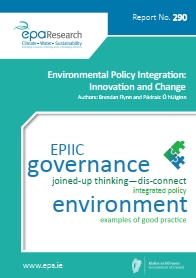
Authors: Brendan Flynn and Pádraic Ó hUiginn, September 2019
Year: 2019
The EPIIC (Environmental Policy Integration: Innovation and Change) project explored the relevance of environmental policy integration (EPI) for Irish environmental governance. EPI involves bringing environmental concerns into all other policy sectors, notably into agriculture, energy and transport.
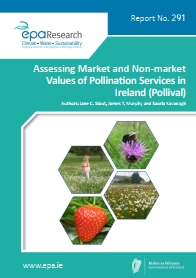
Authors: Jane C. Stout, James T. Murphy and Saorla Kavanagh, September 2019
Year: 2019
The Pollival project used pollinators and pollination services, which have public and political appeal, as a case study for assessing the market and non-market values of ecosystem services.
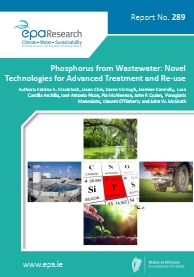
Authors: Katrina A. Macintosh, Jason Chin, Daren McHugh, Jasmine Connolly, Juan Castilla Archilla, José Antonio Pícon, Pia McAleenan, John P. Quinn, Panagiotis Manesiotis, Vincent O’Flaherty, and John W. McGrath., September 2019
Year: 2019
This project reviewed the current state of the art with respect to Phosphorus (P) removal and recycling, assessed the potential of novel removal and recovery systems, and facilitated an All Island Phosphorus Sustainability Workshop.
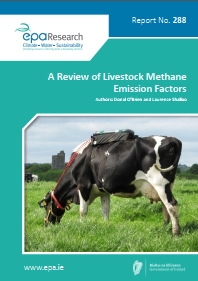
Authors: Donal O’Brien and Laurence Shalloo, September 2019
Year: 2019
Teagasc and University College Dublin, with support from the Environmental Protection Agency (EPA) inventory team, reviewed the livestock methane emission factors used in the national greenhouse gas inventory approach for the agriculture sector and assessed potential reduction strategies.

Authors: Eoin Ó Broin, Andrew Kelly, Gabriela Sousa Santos, Henrik Grythe and Luke Kelleher, September 2019
Year: 2019
The CON+AIR project presents two counterfactual scenarios for emissions and concentrations of air pollutants in Ireland in the year 2030.
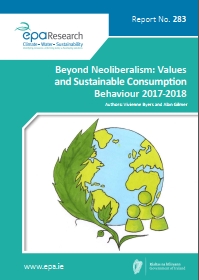
Authors: Dr Vivienne Byers and Dr Alan Gilmer, August 2019
Year: 2019
This desktop research project explores ways to advance understanding of the values and motivations that influence sustainable consumption behaviour in Irish society.
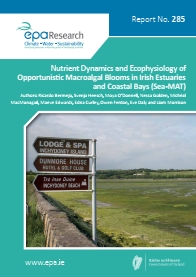
Authors: Ricardo Bermejo, Svenja Heesch, Moya O’Donnell, Nessa Golden, Michéal MacMonagail, Maeve Edwards, Edna Curley, Owen Fenton, Eve Daly and Liam Morrison, August 2019
Year: 2019
The Sea-MAT project aimed to understand the role of local environmental conditions in the development of green tides in Ireland.
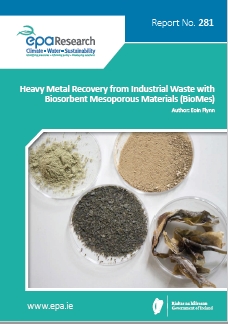
Authors: Eoin Flynn, August 2019
Year: 2019
This project presents a method to cheaply produce high-capacity biosorbents from Irish brown seaweeds.
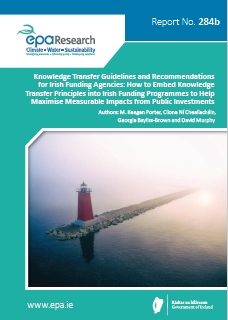
Authors: M. Keegan Porter, Cliona Ní Cheallacháin, Georgia Bayliss-Brown and David Murphy, July 2019
Year: 2019
Knowledge Transfer Guidelines and Recommendations for Irish Funding Agencies: How to Embed Knowledge Transfer Principles into Irish Funding Programmes to Help Maximise Measurable Impacts from Public Investments
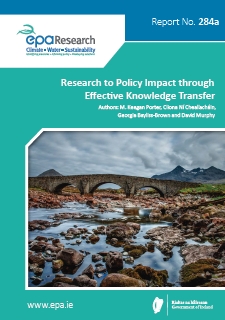
Authors: M. Keegan Porter, Cliona Ní Cheallacháin, Georgia Bayliss-Brown and David Murphy, July 2019
Year: 2019
The Environmental Protection Agency has funded research projects that have increased national understanding of our environment; the challenges it faces; and how Ireland can move towards a more resource-efficient and environmentally friendly economy. However, despite efforts to improve the communication of project findings, translating research into measurable impact remains a challenge for the scientific community.
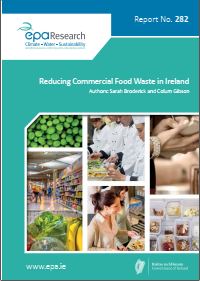
Sarah Broderick and Colum Gibson , July 2019
Year: 2019
Food waste is a global problem that has environmental, social and economic consequences. According to the hierarchy of waste management, prevention is the most favourable action to take when trying to manage food waste. The commercial sector, which refers to food wholesale, retail and service, accounts for 17% of food waste in European countries.
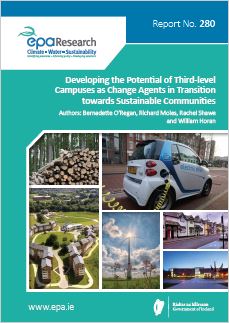
Authors: Bernadette O’Regan, Richard Moles, Rachel Shawe and William Horan, June 2019
Year: 2019
In relation to experimentation with, and demonstration of, novel management approaches and technologies designed to enhance sustainability, higher education institution (HEI) campuses have been identified as ideal testing grounds, as they embrace a diverse population and act as a microcosm of wider society, and control space for demonstration projects.
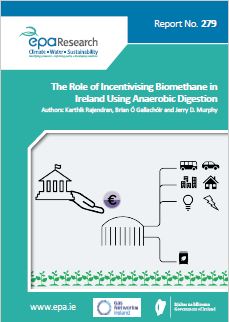
Authors: Karthik Rajendran, Brian Ó Gallachóir and Jerry D. Murphy, June 2019
Year: 2019
Ireland’s renewable energy targets for 2020 include 16% renewable energy; this can be broken down to 40% renewable electricity, 12% renewable heat and 10% renewable transport. Owing to the commercialisation of wind energy, the progression of carbon-free electricity generation is under way; however, this is not the case for heat and transport.
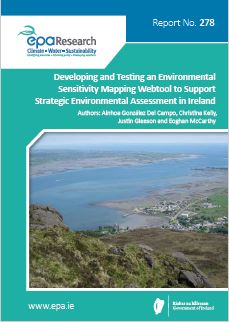
Authors: Ainhoa González Del Campo, Christina Kelly, Justin Gleeson and Eoghan McCarthy, June 2019
Year: 2019
Environmental sensitivity is a critical consideration in natural resource management. In the context of the legislative requirements for impact assessment, environmental sensitivity (or vulnerability) assessments present a framework for systematically determining the potential for significant adverse impacts.
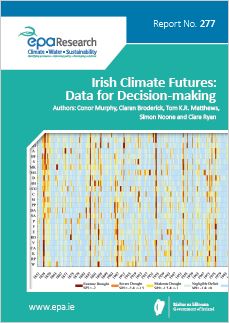
Authors: Conor Murphy, Ciaran Broderick, Tom K.R. Matthews, Simon Noone and Ciara Ryan, June 2019
Year: 2019
The realisation of a climate-resilient Ireland over the coming decades depends on decisions taken at all scales to adapt to climate change. Good decisions depend on the types and quality of information used to inform planning. Building resilience requires the diversification of the types of information used for understanding past and future climate variability and change, and a better understanding of the range of plausible changes.
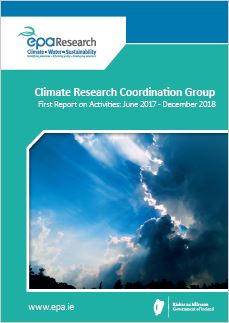
Authors: This report has been prepared by the Climate Research Coordination Group with the assistance of Flannery Nagel Environmental Ltd. Edited by Frank McGovern, Alice Wemaere and Lisa Sheils (EPA). May 2019, May 2019
Year: 2019
This first report presents a summary of the Climate Research Coordination Group’s activities during an 18-month period from June 2017 to December 2018.

Authors: Celine McInerney, Ellen O’Connor, Bernadette Power, Paul Deane and Tom McDermott , May 2019
Year: 2019
Reforms to the European Union Emissions Trading Scheme (EU ETS) in Phase IV create a potential risk to industrial competitiveness in the power generation and heavy industry sectors through increased costs. The costs may be directly linked to greenhouse gas (GHG) emissions via European Union Allowances (EUAs) or may be indirect via increased energy costs.
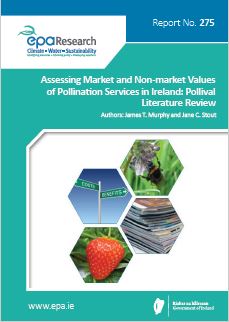
Authors: James T. Murphy and Jane C. Stout, May 2019
Year: 2019
Ecosystems provide various essential amenities, including food and water, and other valuable services to human societies (Joppa et al., 2016). However, ecosystems are increasingly threatened by human population growth, increasing urbanisation and intensity of production, and globalisation, which have resulted in loss and fragmentation of biodiversity, pollution and degradation of habitats, and climate change (Ripple et al., 2017).